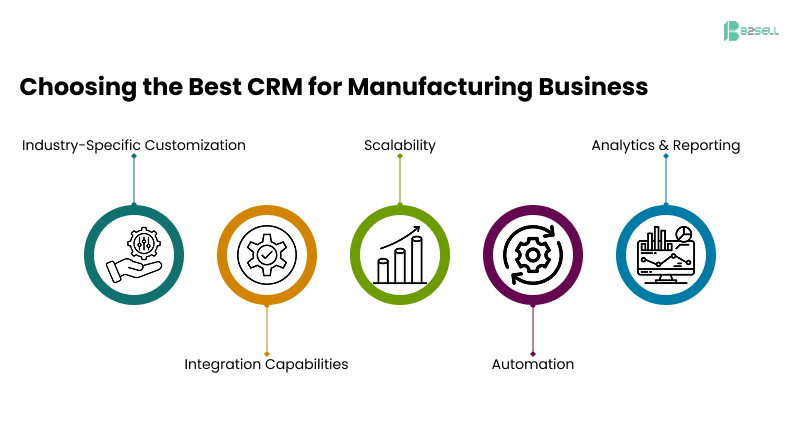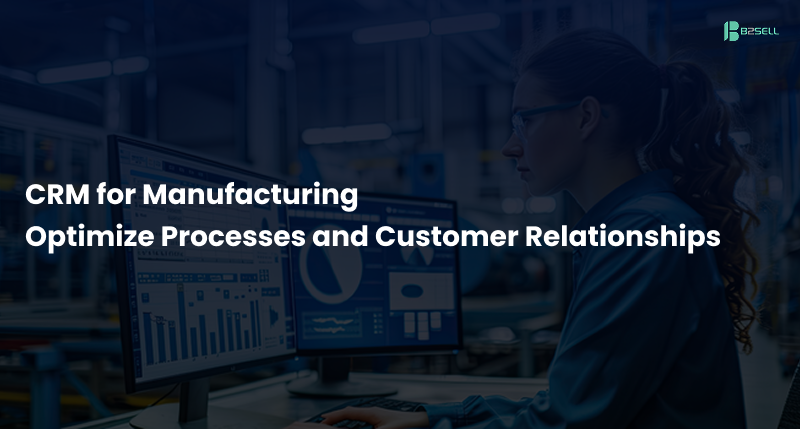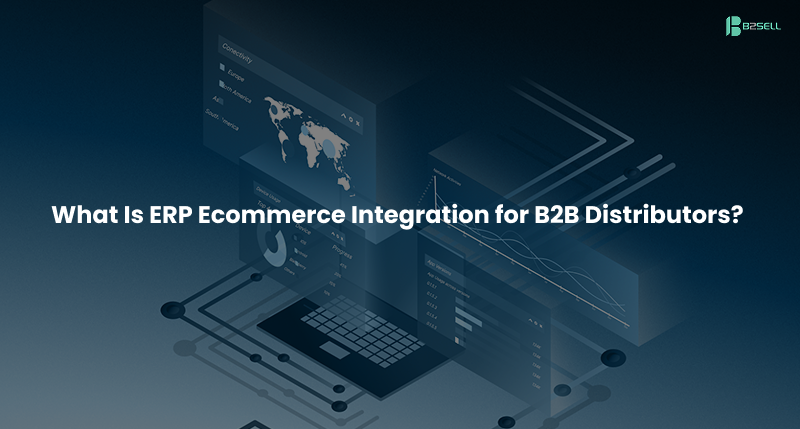Introduction: Why CRM Matters for the Manufacturing Industry
The manufacturing industry is undergoing rapid transformation. Global competition, rising customer expectations, supply chain disruptions, and increasing demand for personalized products have made efficiency and customer relationship management critical.
That’s where CRM for manufacturing industry comes in. Unlike traditional CRMs built only for sales teams, CRM software for the manufacturing industry integrates customer management, sales automation, supply chain collaboration, and after-sales service—all in one platform.
In this guide, we’ll explore how the best CRM for manufacturing businesses can help optimize processes, strengthen customer relationships, and improve profitability. We’ll also uncover why B2Sell Integrations are a powerful way to connect CRM with your ecommerce, ERP, and PIM systems to achieve maximum efficiency.
What is CRM for Manufacturing?
CRM (Customer Relationship Management) for manufacturing is a specialized software solution designed to manage interactions with customers, prospects, and partners in the manufacturing sector. Unlike generic CRM solutions, CRM software for manufacturing industry addresses unique challenges such as complex sales cycles, B2B orders, product configuration, and post-sale service management.
A CRM system for manufacturers helps businesses:
- Track leads and sales pipelines
- Manage customer accounts and contacts
- Monitor production schedules and inventory levels
- Automate sales, marketing, and service workflows
By centralizing customer and operational data, manufacturers can make data-driven decisions, reduce inefficiencies, and strengthen client relationships.
Key Features of CRM Software for the Manufacturing Industry:
.png)
- 360-Degree Customer View: Track all customer interactions from lead to after-sales service.
- Order and Inventory Integration: Sync with ERP for accurate inventory, pricing, and delivery updates.
- Supply Chain Collaboration: Improve communication with distributors, dealers, and vendors.
- After-Sales Service: Manage warranties, repairs, and spare parts requests efficiently.
- Data-Driven Insights: Forecast demand, analyze trends, and optimize resource allocation.
- Lead and Opportunity Management - Track leads from initial contact to final sale, categorize opportunities based on potential revenue, and forecast sales effectively.
- Sales Pipeline Automation - Automate stages of the manufacturing sales process including quotations, approvals, ad order confirmations.
- Customer Account Management - Maintain detailed profiles of clients, including order history, preferences, and communication logs.
- Inventory and Order Tracking - Monitor production schedules, inventory levels, and shipping status to ensure timely delivery.
- Analytics and Reporting - Generate actionable insights to identify bottlenecks, optimize operations, and improve sales strategies.
Why Manufacturing Businesses Need CRM
The Challenges Manufacturers Face Without CRM:
- Disconnected data across sales, production, and supply chain teams.
- Difficulty managing dealer/distributor relationships.
- Slow response to customer inquiries and complaints.
- Inaccurate demand forecasting leading to stockouts or overproduction.
Benefits of CRM for Manufacturers:
- Improved lead-to-order cycle.
- Better collaboration between sales, marketing, and operations.
- Accurate demand forecasting.
- Enhanced customer loyalty through proactive service.
- Increased profitability via data-driven decisions.
Types of CRM Systems for Manufacturing
Different manufacturers have different requirements. Here are common CRM types:
- Operational CRM – Focuses on automating sales, marketing, and service workflows.
- Analytical CRM – Offers insights based on data analysis, helping manufacturers forecast demand and identify trends.
- Collaborative CRM – Ensures seamless communication between departments, partners, and suppliers.
Choosing the right CRM type depends on your business goals, team size, and existing infrastructure.
Benefits of CRM Software for the Manufacturing Industry

1. Streamlined Sales and Order Management
Manufacturers deal with long sales cycles and complex orders. CRM systems for manufacturing help track every stage—from RFQs to contracts—ensuring faster deal closure.
2. Improved Customer Service
With CRM for manufacturing businesses, after-sales service becomes proactive. Manufacturers can track warranty claims, service histories, and customer preferences to enhance satisfaction.
3. Demand Forecasting and Production Planning
CRMs integrated with ERP provide real-time insights into customer demand and order trends, reducing waste and optimizing production.
4. Dealer and Distributor Management
For manufacturers who sell via channel partners, CRM software for the manufacturing industry centralizes partner communication, order processing, and performance tracking.
5. Integration with Ecommerce and PIM
Modern manufacturers often sell online. Integrating CRM with ecommerce platforms like Shopify PIM ensures consistent product information, real-time inventory updates, and seamless order management.
FAQs
What is the best CRM software for manufacturing businesses?
The best CRM for manufacturing is one that integrates sales, customer service, ERP, and supply chain operations. Options like Salesforce Manufacturing Cloud, Microsoft Dynamics 365, and B2Sell’s CRM-integrated solutions are popular.
How does CRM help manufacturers improve customer relationships?
CRM allows manufacturers to track every interaction—sales history, service requests, order updates—enabling personalized service and stronger relationships.
Can CRM software integrate with ERP and PIM systems in manufacturing?
Yes. The best CRM software for manufacturing integrates with ERP systems for operations and PIM solutions like Shopify PIM for product data management. This ensures accuracy across channels.
Why is CRM important for manufacturers selling online?
With ecommerce growth, manufacturers need consistent product data, pricing, and order tracking. A CRM integrated with Shopify PIM and B2Sell Integrations ensures smooth digital selling.
What are the top features to look for in CRM for manufacturing industry?
- ERP integration
- Distributor management
- Order tracking
- After-sales service management
- Real-time analytics and forecasting
How CRM Optimizes Manufacturing Processes
.png)
1. Sales Cycle Optimization
Manufacturing deals often involve multiple stakeholders. CRM centralizes communication and automates follow-ups.
2. Production Alignment
By forecasting demand, CRM ensures manufacturing schedules align with customer needs.
3. Supply Chain Visibility
Manufacturers gain insights into supplier performance, shipment delays, and distributor sales data.
4. Customer Lifecycle Management
CRM doesn’t stop at sales—it extends to after-sales support, warranty claims, and service scheduling.
How CRM Strengthens Customer Relationships in Manufacturing
Personalized Engagement
Track customer history and preferences to offer personalized service.
Proactive Support
Use predictive analytics to anticipate customer needs and resolve issues before they escalate.
Loyalty Programs for B2B Customers
Reward distributors and recurring clients with incentives managed via CRM workflows.
Best CRM Software for Manufacturing Industry
Here are some leading solutions:
- Salesforce Manufacturing Cloud – Robust analytics, forecasting, and B2B collaboration.
- Microsoft Dynamics 365 for Manufacturing – Strong ERP-CRM integration.
- HubSpot CRM for Manufacturers – Easy-to-use solution for growing businesses.
- Zoho CRM for Manufacturing – Affordable and customizable.
- B2Sell CRM Integrations – Tailored for distributors and manufacturers with ecommerce and ERP connectivity.
Choosing the Best CRM for Manufacturing Business
When selecting the best CRM software for manufacturing, decision-makers should evaluate the following features:

- Industry-Specific Customization: Manufacturing requires features like order tracking, service management, and real-time inventory integration.
- Integration Capabilities: The CRM must integrate with ERP systems, supply chain software, and product information management platforms.
- Scalability: As your business grows, the CRM system should support expansion without requiring a complete overhaul.
- Automation: From lead nurturing to customer service ticketing, automation saves time and reduces operational errors.
- Analytics & Reporting: Detailed insights into customer behavior and sales performance are crucial for continuous improvement.
B2Sell Integrations: Powering CRM for Manufacturing Businesses
While standalone CRMs are powerful, their true potential is unlocked when connected with ecommerce, ERP, and PIM systems. That’s where B2Sell Integrations comes in.
Why Choose B2Sell Integrations?
- ERP + CRM + PIM + Ecommerce Sync – Get a unified view of operations.
- Shopify PIM Integration – Centralize product data across platforms.
- Real-Time Order & Inventory Updates – Improve efficiency and customer trust.
- Automation-Driven – Reduce manual work and errors.
- Custom Solutions for Manufacturers – Built for the complexities of B2B manufacturing.
Example Use Case:
A manufacturer selling through distributors and Shopify storefronts can integrate:
- ERP for production data.
- CRM for customer relationships.
- Shopify PIM for product data management.
- B2Sell Integration to connect it all.
This results in streamlined operations, accurate product data, and better customer experiences.
Conclusion: Future of CRM in Manufacturing
The best CRM software for manufacturing industry is no longer a nice-to-have—it’s essential. From optimizing production and managing distributors to delivering personalized customer service, CRM transforms how manufacturers operate.
By combining CRM with Shopify PIM and B2Sell Integrations, manufacturers unlock efficiency, consistency, and scalability in a competitive market.
👉 If you’re ready to optimize your manufacturing processes and strengthen customer relationships, explore B2Sell Integrations today.


.png)




.png)